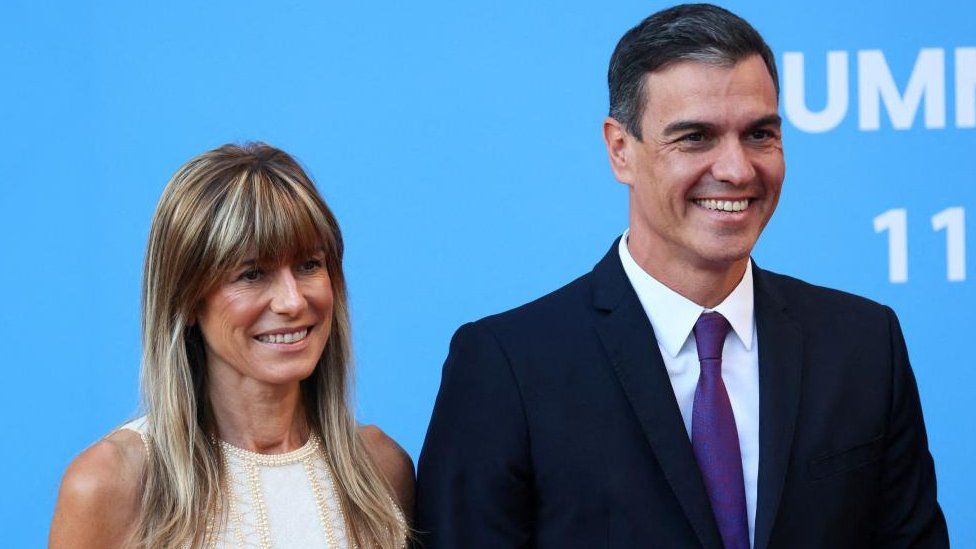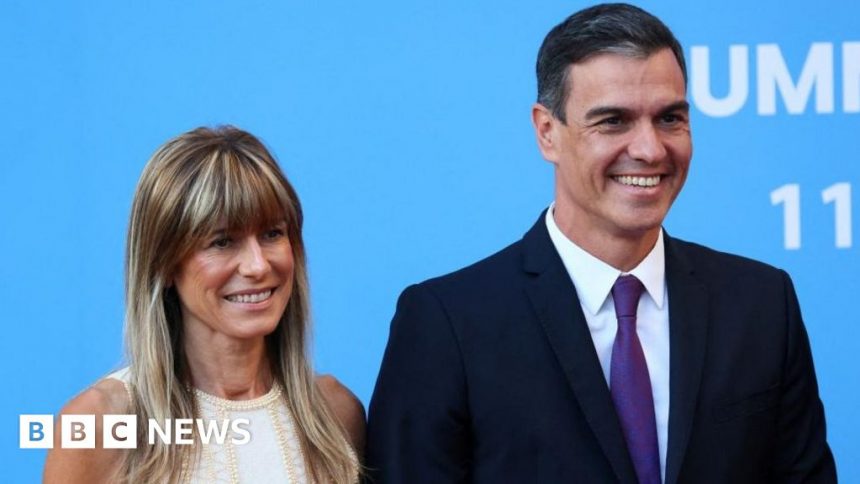Spain’s PM Pedro Sánchez halts public duties as wife faces inquiry
-
Published

Spanish Prime Minister Pedro Sánchez has suspended public duties to “stop and reflect” on whether to remain in the job, after a court opened a preliminary inquiry into his wife.
In a statement, the Spanish leader said he urgently needed to decide “whether I should continue to lead the government or renounce this honour”.
The court said it was responding to corruption claims against Begoña Gómez.
Mr Sánchez said he would make a decision on his future next Monday.
His wife would defend her honour and work with the judiciary, he said, to make clear there was no substance to the allegations against her.
The complaint against Begoña Gómez was raised by anti-corruption campaigners Manos Limpias (Clean Hands), who have taken part in a number of high-profile court cases in recent years and are led by a man linked to the far right called Miguel Bernad.
Manos Limpias put out a statement on Thursday signed by Mr Bernad acknowledging that its allegations might be false, because they were based on online newspaper stories: “If they are not true, it will be up to those that published them to take responsibility for the falsehood.”
The Socialist prime minister said he would give a statement to the media on 29 April, after reflecting whether it was worth remaining in office “despite the mud” that the right and far right were trying to turn politics into.
In a lengthy statement on X, Mr Sánchez complained of a “strategy of harassment” over months aimed at weakening him politically and personally targeting his wife.
The court did not give details of the accusations against Begoña Gómez other than to say it had begun investigating allegations of influence peddling and corruption on 16 April.
However, the Cadena Ser website published details of the Manos Limpias complaint, which included a list of allegations culled from news websites including El Confidencial and Voz Populi.
El Confidencial reported on Wednesday that the inquiry was looking into Begoña Gómez’s links to private companies that had secured government money or public contracts.
In particular, it cited a “sponsorship agreement” involving tourism group Globalia and a foundation she ran in 2020 called IE Africa Center. In 2020, Globalia secured a €475m (£407m) bailout for its airline Air Europa, as part of a series of government rescue packages for companies during the Covid-19 crisis.
The legal complaint was signed by Miguel Bernad, the head of Manos Limpias, which describes itself as a trade union and has in the past targeted politicians, bankers and King Felipe VI’s sister, Princess Cristina.
Spain’s conservative Popular Party (PP) demanded explanations in parliament earlier on Wednesday, to which the prime minister said simply that he believed in justice “despite everything”.
Spanish media said he had left parliament for his Madrid residence visibly upset. Hours later he accused PP leader Alberto Núñez Feijóo of working with far-right party Vox to bring him down.
“I am not naive. I realise they are denouncing Begoña, not because she has done anything illegal – they know there is no case – but because she is my wife,” he complained in his statement.
Political allies expressed support for Mr Sánchez, who has been in power since 2018, but his decision to suspend public duties comes at a tense time for his Socialist party ahead of European Parliament elections in June and elections in the Catalonia region of north-eastern Spain next month.
He was due to take part in a Catalan campaign launch in Barcelona on Thursday.
Pedro Sánchez leads an awkward coalition that includes two Catalan separatist parties, which were persuaded to join the government in return for an amnesty that covered a banned Catalan referendum on secession in 2017.
Without the support of the Catalan Republican Left (ERC) and Together for Catalonia (JxCat) he would not have been able to stay in power, following an inconclusive election last year.
Opposition parties were outraged by the amnesty, which also means the former Catalan regional leader Carles Puigdemont will stand in next month’s regional vote, seven years after he fled imminent arrest and went into exile in Belgium.
Mr Puigdemont is still facing a terrorism case but believes the amnesty will enable him to return to Spain.
Related Topics
-
-
Published16 November 2023
-
-
-
Published8 November 2023
-
-
-
Published14 March
-






